Mae govannen, friends! Josh here with another guest post for you today from Marc Sims. Today’s post is the second in a miniseries from Marc called “Tolkien’s Guide to Defiant Joy.” If you haven’t read it yet, you can read Part One - Reject Despair, Embrace Folly, here .
Also, welcome to all of you who are here because of the guest post I had last week for the Official C.S. Lewis Substack on The Four Laughs! So glad to have you join this Fellowship!
Enjoy the content Jokien with Tolkien brings to your inbox each week? Consider supporting JWT and joining the Extended Edition Paid Membership!
It’s $5 a month or $40 a year and you get full Discord access, bonus content every month, and the good feeling of supporting quality content like the below guest article.
Special shoutout to Mary F and John B, who joined the Extended Edition by becoming paid subscribers this week!
Thank you! Hit the button below for the details:
Reject Despair; Die Well
Fortitude presumes vulnerability…an angel cannot be courageous because it is not vulnerable.
- Josef Pieper-
Black is Mightier Still
The last city of man is in flames. A pillar of light alone in a sea of darkness.
Minas Tirith, the beacon of Gondor, has been the dike holding the forces of Mordor back from sweeping over the West.
If it falls, all of Middle-earth shall be lost.
But it has fallen. The black tide has risen and overrun the banks.
The strength of Numenór has faded as the power of Mordor has grown. Gondor has less than a tithe of Sauron’s strength, and none can stand before his deadliest weapon: the Nazgûl.
The dark, cloaked figures have the nightmare-like quality of crippling fear. With each cry: “even the stout-hearted would fling themselves to the ground as the hidden menace passed over them, or they would stand, letting their weapons fall from nerveless hands while into their minds a blackness came, and they thought no more of war; but only of hiding and of crawling, and of death.”1
The captain of the Ringwraiths approaches the gates of Minas Tirith and, “speaking in some forgotten tongue words of power and terror to rend both heart and stone,” he bursts them apart.
In rode the Lord of the Nazgûl. A great black shape against the fires beyond he loomed up, grown to a vast menace of despair. In rode the Lord of the Nazgûl, under the archway that no enemy ever yet had passed, and all fled before his face.
All save one. There waiting, silent and still in the space before the Gate, sat Gandalf upon Shadowfax…
‘You cannot enter here,’ said Gandalf, and the huge shadow halted. ‘Go back to the abyss prepared for you! Go back! Fall into the nothingness that awaits you and your Master. Go!’
…
‘Old fool!’ he said. ‘Old fool! This is my hour. Do you not know Death when you see it? Die now and curse in vain!’2
The only person willing to stand against this Satanic force is Gandalf the White, a small flame before a wave of darkness. He is outmatched.3 His threat, though authoritatively spoken, is “vain” to the Nazgûl.4 What are mere words in the face of Death itself?
Gandalf does not have the strength of arms to win. He stands as a tender shoot of courage before a machine of malice, compelled not by surety of victory but by a simple, childlike faith that evil must be resisted, even if one dies in the process.5
To be brave means to be ready to sustain a wound…Thus every brave deed draws sustenance from preparedness for death.
- Josef Pieper -
A Tale of Two Kings
Meanwhile, the steward of Gondor, Denethor, has taken a more realistic approach. Gifted with a shrewd mind, Denethor has perceived how dire their situation is. He has used his seeing-stone (palantír) to see beyond what any mortal man would be able to, and he sees that the force at their door is but the finger of Sauron’s outstretched arm, that more reinforcements are coming, and that any chance of victory is futile.
No help is coming, death is certain, his sons have perished, Gondor has fallen. All that remains is the final gasp of resistance before all is snuffed out.
Denethor represents the iron grip of despair: nothing will improve, nothing can stop it, nothing matters. Much earlier, Gandalf warns us all:
Despair is only for those who see the end beyond all doubt. We do not.6
Denethor simply believes that he does see the end beyond all doubt, and so despair is the only logical response.
But, he is wrong. He does not see the end.
Faramir lives. Aragorn is sailing in from the south. Rohan rides in from the north. And two hobbits are but a few days away from destroying the Ring and ending Sauron’s domain forever. Despite—or, rather, because of—his lofty mind and powerful technology,7 Denethor is certain none of this could be so, and thus succumbs to the blindness of rage and despair.
Despair always feeds on presumption.
But this doesn’t mean courage comes from ignorance.
Théoden, king of Rohan, rides to the fields of Pelennor. His people have just endured a harrowing battle at Helm’s Deep. Wearied though they are and few in men, they answer Gondor’s call for aid. But, as the exhausted forces march south, the cursed skies darken and a gloom of hopelessness settles upon the Rohirrim.
By the time they arrive, they find things far worse than they imagined:
The City was now nearer. A smell of burning was in the air and a very shadow of death. The horses were uneasy. But the king sat upon Snowmane, motionless, gazing upon the agony of Minas Tirith, as if stricken suddenly by anguish, or by dread. He seemed to shrink down, cowed by age. Merry himself felt as if a great weight of horror and doubt had settled on him. His heart beat slowly. Time seemed poised in uncertainty. They were too late! Too late was worse than never! Perhaps Théoden would quail, bow his old head, turn, slink away to hide in the hills.
Théoden had spent years under the spell of Saruman, Sauron’s puppet. Indolence and senility had set in prematurely as he lingered under Wormtongue’s influence. But like a tree shaking off heavy snow, new vigor and fury were granted to Théoden through the help of Gandalf. Yet, who could stand now against such impossible odds? Who could lead their men into such certain defeat, to throw oneself into the very teeth of Death? Théoden begins to crumple back under the weight of old age.
Fortitude presumes to a certain extent that a man is afraid of evil; its essence does not consist in knowing no fear but rather in not allowing himself to be compelled by fear into evil or to fail to accomplish the good.
- Josef Pieper -
Then suddenly Merry felt it at last, beyond doubt: a change. Wind was in his face! Light was glimmering. Far, far away, in the South the clouds could be dimly seen as remote grey shapes, rolling up, drifting: morning lay beyond them.
But at that same moment there was a flash, as if lightning had sprung from the earth beneath the City. For a searing second it stood dazzling far off in black and white, its topmost tower like a glittering needle; and then as the darkness closed again there came rolling over the fields a great boom.
At that sound the bent shape of the king sprang suddenly erect. Tall and proud he seemed again; and rising in his stirrups he cried in a loud voice, more clear than any there had ever heard a mortal man achieve before:
Arise, arise, Riders of Théoden!
Fell deeds awake: fire and slaughter!
spear shall be shaken, shield be splintered,
a sword-day, a red day, ere the sun rises!
Ride now, ride now! Ride to Gondor!With that he seized a great horn from Guthláf his banner-bearer, and he blew such a blast upon it that it burst asunder. And straightway all the horns in the host were lifted up in music, and the blowing of the horns of Rohan in that hour was like a storm upon the plain and a thunder in the mountains.
There are many similarities between Denethor and Théoden.8 But the essential difference could not be more stark. Théoden categorically rejects the temptation to despair; Denethor embraces it. Both men die in the midst of the battle, yet their deaths stand opposed to each other: one dies heroically, selflessly, nobly; the other tragically, selfishly, arrogantly. Théoden is slain; Denethor slays himself. Théoden displays courage in the face of death, in defiance of death; Denethor displays cowardice through his acquiescence to death.
Tolkien makes it obvious for us: pride and despair are the twin serpents of cowardice. Whereas courage and hope are the wings of heroism.
Denethor dies a crazed, belligerent man, attempting to murder his son in the process, refusing to cede the tiniest modicum of power to others, even in his own death.9 His despair has poisoned him, twisted him, diminished him into an un-man.
Théoden dies a hero, valiantly riding to the rescue of mankind—of Gandalf himself10— and the destruction of evil, laying down his life for the sake of others. His fortitude and hope in the face of hopelessness expands him; he becomes more humane, even as he dies.
The virtue of fortitude protects a person from loving his life in such a way that he loses it.
- Josef Pieper -
Courage, Courage For Our Friends…
The power of despair feeds on the intoxication of pride. Its twin vice is its inverse opposite: blind optimism. It is the implacably certain individual whose hubris elevates his estimation to the level of omniscience: there is no outcome or circumstance that I have not thought of—I see all. This may lead one to an unwarranted confidence, or unmitigated despair. And the more intelligent and technologically powerful the individual is, the more extreme these valleys and mountains will be.
Courage is antithetical to both despair and invincible optimism. Courage presumes that the danger is real—that one may really perish in the struggle. But it rejects the sluggish descent into nihilism. Nothing saps courage faster than despair. If the struggle is hopeless, why struggle at all? Why fight? Why not slip into the dark chasm yourself while you still have the choice?
Courage stands in the gap between the cocksure swagger and the depressant’s resignation. It is neither security, nor defeat. Gandalf has no promise that he will be rescued as he stands against the Nazgûl. Théoden has no guarantee that he will not be leading his army to a humiliating defeat. There are no certainties here.
Whoever in such a situation of unqualified seriousness, in the face of which any miles gloriosus (glorious soldier) falls mute and every heroic gesture becomes crippled, nonetheless advances toward the horror and does not allow himself to be prevented from doing the good, specifically for the sake of the good and thus finally for the sake of God, not out of ambition or out of fear of being taken for a coward: that person is truly courageous.11
Of course, this means that we must be prepared to die. It is not for no reason that Jesus described His Way as being inherently cruciform. We must die to ourselves, die to our passions, die to the world. We must do this now so that when we the decisive moment of risk presents itself—when we must stand before the wave, uncertain that we will remain afterwards—we look more like Gandalf and Théoden, and less like Denethor.
Remember, courage is not reserved only for heroic conquests like Tolkien’s legendarium. Courage is displayed in a thousand small moments of honesty, integrity, mercy, and love; when doing the right thing seems to lead down, not up; when resisting evil leads to the uncontrollable, uncertain risk; to a kind of death. There, in the shadow of death, is the only place courage resides.
How do we nourish such courage?
First, categorically and decisively reject despair. You do not see all ends—you are not God.
Second, die well. Denethor’s suicide is the culmination of a poor life. Pride and despair have shaped him. Théoden’s death, on the other hand, is the culmination of a life of courage, a life that knows that there are worse evils than dying, and greater goods than self-preservation.
We can die well by remembering that even if we perish—if we lose our job, if the conversation doesn’t end well, if we humiliate ourselves, if we sense our bodies weakening—Death is not the end. Christians are those who can die well because we have already died in our Savior. And as He rose, so too shall we. Our lives now are but the fleeting moments one experiences upon the front porch of some great, eternal palace, the first few sentences of a story that gets better with every page. This earthly life is not the whole of our home, our story, but only the beginning.
In sorrow we must go, but not in despair. Behold! we are not bound for ever to the circles of the world, and beyond them is more than memory.12
Read Part 3 here:
Hey! Thanks for reading! Did you like this post? Then why not subscribe to Marc's Substack, Et Cetera, to get more like it straight to your inbox?Interested in writing a guest piece like the above? Check out my submission guidelines
📚 You can read more of my writing by reading my books! My latest is a collection of essays on The Lord of the Rings, The Silmarillion, and more of Tolkien’s works (and their adaptations). You can also find it and more of my books on Amazon or Gumroad
⚔️ If someone forwarded this email to you or you found it through social media or Google, I’d like to invite you to join 13,000+ subscribers in the Jokien with Tolkien community: Subscribe here and get a free gift just for joining!
🏹 Chosen as a Substack Featured Publication in 2023
🪓 Official merch available in the Jokien with Tolkien store
❌ All typos are precisely as intended
🔗 Links may be affiliate, which is a free-to-you way to support this newsletter where I earn a small commission on items you purchase
🗃️ Can’t wait till next week for more content? View the archive
🤝 Want to sponsor a future issue of Jokien with Tolkien? View my rates and packages
The Return of the King, “The Siege of Gondor”
Ibid.
“War is upon us and all our friends, a war in which only the use of the Ring could give us surety of victory. It fills me with great sorrow and great fear: for much shall be destroyed and all may be lost. I am Gandalf, Gandalf the White, but Black is mightier still.” The Two Towers, “The White Rider”
Repeatedly in Lord of the Rings, Tolkien has his heroes set in hopeless, dire situations speak to the forces of evil as if they are actually in a position of strength:
Gandalf to the Balrog: You cannot pass.
Aragorn in Helm’s Deep, addressing the forces that have them surrounded: Depart, or not one of you will be spared. Not one will be left alive to take back tidings to the North. You do not know your peril.
Aragorn at the Black Gate: Let the Lord of the Black Land come forth! Justice shall be done upon him. For wrongfully he has made war upon Gondor and wrested its lands. Therefore the King of Gondor demands that he should atone for his evils, and depart then for ever. Come forth!’
Of course, Gandalf has been here before in his contest with the Balrog on the Bridge of Khazad-dûm. There, he did die.
The Fellowship of the Ring, “The Council of Elrond”
“The knowledge which he obtained was, doubtless, often of service to him; yet the vision of the great might of Mordor that was shown to him fed the despair of his heart until it overthrew his mind.” The Return of the King, “The Pyre of Denethor”
Both have hobbits attached as servants, both command the final kingdoms of men, both are flawed, and both die in this momentous battle. Their very names invite comparison. “Denethor” and “Théoden” only differ by one letter. Significantly, “Théoden” begins with “Theo”, from theos, Greek for “God.”
“Authority is not given to you, Steward of Gondor, to order the hour of your death,” answered Gandalf. “And only the heathen kings, under the domination of the Dark Power, did thus, slaying themselves in pride and despair.” The Return of the King, “The Pyre of Denethor”
“Gandalf did not move. And in that very moment, away behind in some courtyard of the City, a cock crowed. Shrill and clear he crowed, recking nothing of wizardry or war, welcoming only the morning that in the sky far above the shadows of death was coming with the dawn. And as if in answer there came from far away another note. Horns, horns, horns. In dark Mindolluin’s sides they dimly echoed. Great horns of the North wildly blowing. Rohan had come at last.” The Return of the King, “The Siege of Gondor”
Josef Pieper, On the Virtues of the Human Heart, p. 27
The Return of the King, “Appendix A”




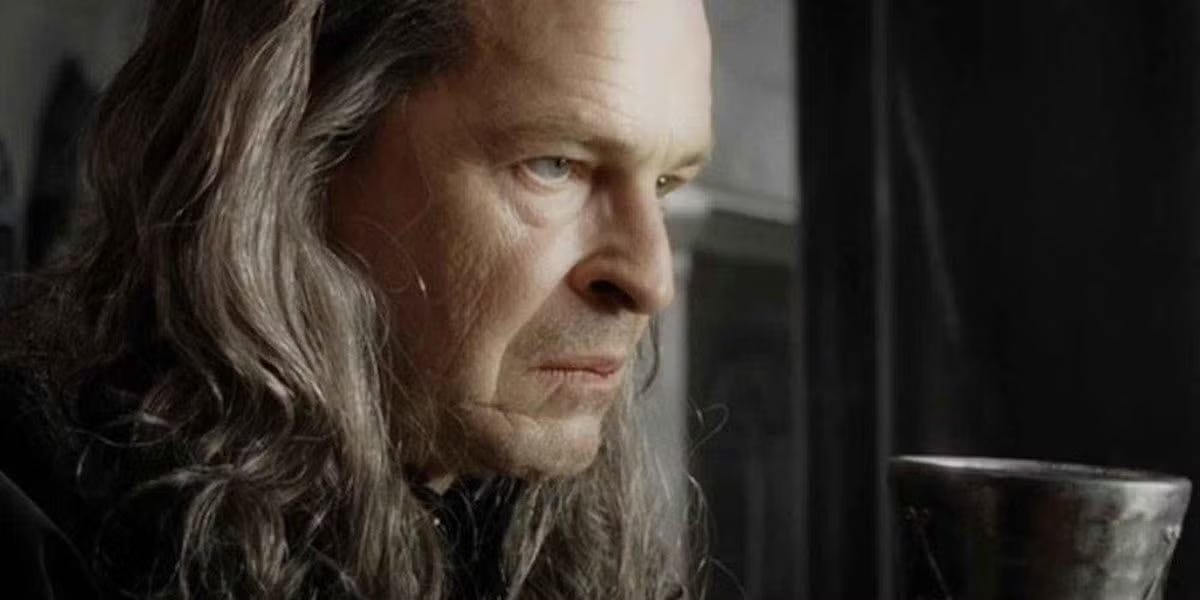
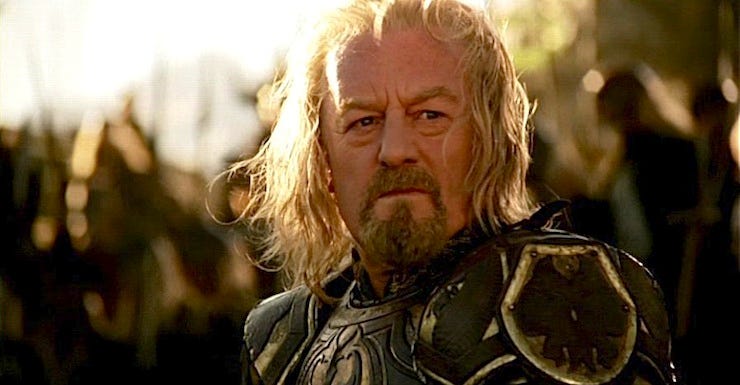
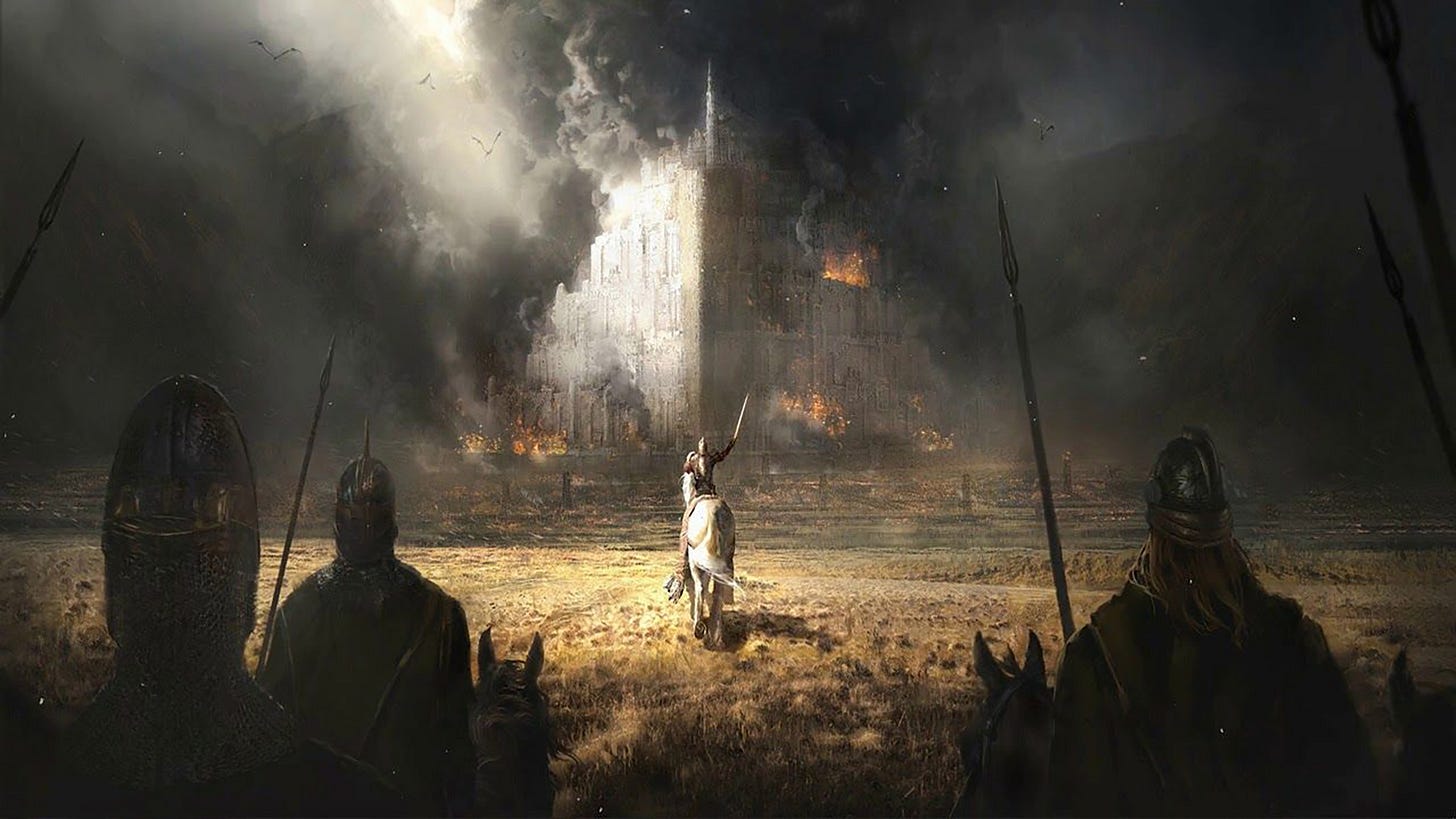
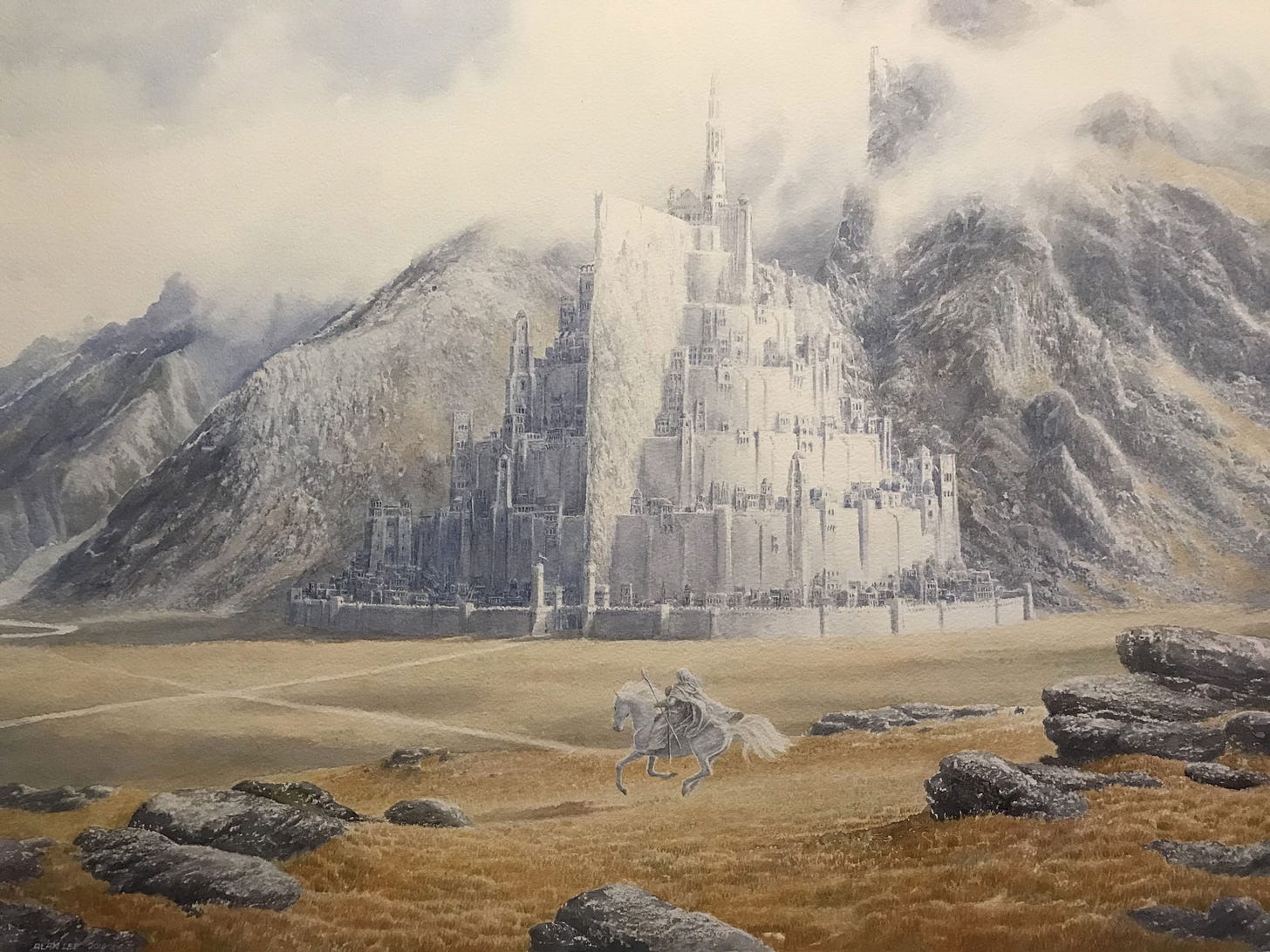


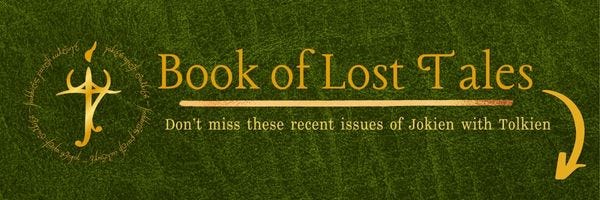



This was so beautifully well written it moved me to tears. I have a chronic illness that often drives me into despair, and I'll save this email to re-read it every time the darkness feels too close. Well done and thank you.
You've jogged my memory of so many things that I had forgotten or not known until now.